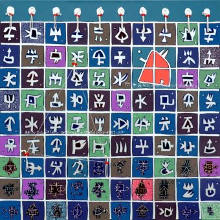The Graham Album Review #1994

Click on CD Cover for Audio Review in streaming mp3 format | |
Okan Ersan: Nibiru
by George Graham
(Independent release as broadcast on WVIA-FM 8/14/2019)

Click on CD Cover for Audio Review in streaming mp3 format | |
Okan Ersan: Nibiru
by George Graham
(Independent release as broadcast on WVIA-FM 8/14/2019)
For many decades, jazz has been one of the most successful American exports. There have been times when the art-form was appreciated more overseas than it was in the country where it was born. In more recent decades, jazz-rock fusion has also been taken up by artists from all over, and indeed some of the more influential artist have come from elsewhere, such as John McLaughlin from the UK, Jean-Luc Ponty from France, and Joe Zawinul of Weather Report who was born in Austria. This week we have a first-rate fusion release by a Cypriot guitarist, with his mostly Turkish band. It’s Okan Ersan, and his new third release is called Nibiru.
Okan Ersan was born is Cyprus in 1972 and graduated with a music degree from Marmara University in Istanbul in 1994. He lists some of his guitar influences as Al DiMeola, Scott Henderson, Robben Ford, and Mike Stern. His touring has brought him to the US, where he performed at the Kansas City Jazz Festival, and over the years served as an opening act for Chick Corea, DiMeola, McLaughlin and others. He also previously recorded with drummer Dave Weckl, of the Chick Corea Elektric Band.
His new album Nibiru was recorded in Istanbul, with three Turkish-born players, Serkan Ozyilmaz on keyboards, Elem Pelit on bass and Volkan Oktem on drums. But the music is very much international, with an electric fusion sound that is both classic in its approach, recalling such artists as Jaco Pastorius, and especially Allan Holdsworth, with some more contemporary touches. Missing is any significant sonic indication that this music came from the Near East.
The title Nibiru is a reference to a fictitious planet of the same name, and the album’s seven tracks are titled as “chapters” in a kind of time and space journey, with titles like Gravitational Waves, and Deep Field a reference to one of the instruments on the Hubble Space Telescope. Some of the music can hint at space and sci-fi, but for the most part, the music is rather straight-ahead fusion, with tracks that range from very electric and angular, to one that is more of a ballad. Ersan is a first-rate guitarist, keeping the music interesting without getting into rock guitar cliches. The rest of the band are similarly tasteful, gathering the best influences of the fusion scene. Keyboard man Serkan Ozyilmaz can slip easily between some very electric keyboards, including what sounds like old analog synthesizers to more acoustic piano sounds. Drummer Volkan Oktem puts in some impressive solos on the album.
Each of the tracks has a numbered chapter name with a subtitle. The opening piece, Chapter One is called 6EQUJS (Wow Signal), named after what is thought to have been an extra-terrestial radio signal received in 1977, with the Morse code representation of the characters forming a rhythmic motif. The sound is classic fusion, showing the influence of Allan Holdsworth in the harmonic structure, with hints of the Chick Corea Electrik Band. <<>>
The following piece As Far Away As Possible is said to be inspired by the vastness of space and how light years are used for calculating distances. Keyboard man Ozyilmaz is featured prominently. I can hear some influence by Joe Zawinul of Weather Report in the arrangement. <<>>
On the more rock-oriented side of the fusion spectrum is Deep Field which is also nicely done, with interesting harmonic and sonic bits to keep things out of the realm of fusion cliches. <<>>
Things are even edgier on the track called Gravitational Waves with Ersan getting out his rock chops. <<>>
The “chapter” called Transcending is well-named for its more contemplative sound, with almost acoustic instrumentation <<>> though Ersan gets out a guitar synthesizer for his solo. <<>>
The album’s title track Niburu gives Ersan more room for a guitar solo, and he puts it to best advantage, with some impressive playing. <<>>
The recording closes with its shortest but most electric and rather quirky piece Space Jungle – Anunnaki. It has a kind of science-fiction sound to it, with the guitar and keyboard approach, along with what sounds like alien voices. <<>>
Okan Ersan’s new album Nibiru shows that the jazz rock fusion scene is flourishing internationally. The Cyprus-born guitarist and his Turkish band create music with the best of them. He joins another Turkish Cypriot fusion artist also named Ersan, bassist Oytan Ersan who released a strong album last year, and performers like Tigran Hamasyan from Armenia and Somesh Mathur from India, with worthwhile electric jazz-rock.
Our grade for sound quality is an “A.” Though the instrumentation is very electric and cranked up at times, there is good clarity, and the sound is clean and punchy.
While the jazz rock-fusion scene emerged over 40 years ago, it remains active in places both near and far.
(c) Copyright 2019 George D. Graham. All rights reserved.
This review may not be copied to another Web site without written permission.
 To Index of Album Reviews | To George Graham's Home Page. | What's New on This Site.
To Index of Album Reviews | To George Graham's Home Page. | What's New on This Site.